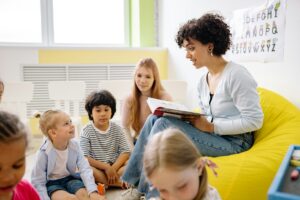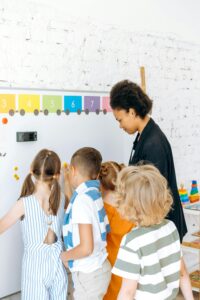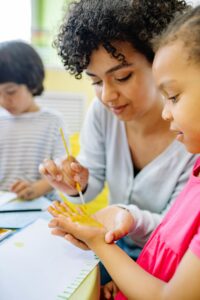
Kindergarten Readiness is the Path to Success in Life In and Out of the Classroom
If you ever needed any indication of how your child will fare throughout their life as a student and even their success in their career, look to their preparedness before kindergarten. It’s crazy to think that skills that are attained at this young age can predict your child’s success later in life, but research shows that children who enter their kindergarten classroom with certain skills tend to have more success in their academics later in life. It’s important to note that kindergarten readiness encompasses skills that a child has before they enter their kindergarten classroom that set them up for success. Kindergarten readiness is defined as “certain things a child should know and be able to do” before they begin kindergarten. Those who exhibit kindergarten readiness in the forms of language and literacy development and social/emotional skills are said to have success in kindergarten and beyond. But where does this kindergarten readiness come from?

What skills are needed, and where do they come from?
Early childhood education programs are one of, if not the most, important factors when it comes to kindergarten readiness. Namely, full-day preschool programs have shown significant results when it comes to kindergarten readiness. These programs are your child’s first introduction to formal education and are where they learn the foundations of academic, social, and emotional skills.
- Academic
- Language development: A child’s ability to formulate longer sentences grows as their vocabulary grows. Their vocabulary reflects their environment and experiences, and they can utilize it to efficiently recall/retell their experiences to others. They also learn more descriptive words to express how they feel and gain a better understanding of how to speak in certain settings.
- Literacy development: Children are introduced to the foundational skills for reading and writing, such as learning their letters, recognizing sounds, and rhyming. They learn how to listen to comprehend through storytelling and having books read aloud to them. They also engage in conversation with people their age and older, which teaches them how to listen and respond appropriately.
2. Social
- Problem Solving: During this stage, children are going to be faced with new problems (personal and interpersonal). Under the guidance of teachers/volunteers in early childhood education programs, they will learn how to acknowledge a problem and learn how to rectify it. Skills of cooperation, sharing, and compromise are important to learn early, as they are the same skills your child will utilize in their adult life to solve problems.
- Conflict Resolution: Conflict resolution goes hand and hand with problem solving, but the key difference is teaching children the necessary steps of conflict/resolution. And while they may not be able to comprehend fully, introducing this skill is important early so they can continue to grow their understanding of it and apply it to different situations.
Steps to Conflict/Resolution for Students in Early Childhood Education Settings
- Separate children if emotions are too high to prevent things from becoming physical.
- Exhibit calm behavior for children so they know they don’t have to be on guard or defensive.
- Give each child a chance to speak and express themselves, and reiterate what they said to show understanding.
- Identify the problem and make sure each child agrees.
- Let the children brainstorm a solution with your input if needed.
- Agree on a solution that both children agree to and clearly understand.
- Make sure the solution is being followed, and praise the children for their ability to resolve a conflict.
- Interpersonal Skills: In the classroom, children can make friends, cooperate in group settings, learn societal norms (please and thank you), and develop empathy for those around them (learning how to care for others outside of themself).
3. Emotional
- Self-regulation: Children learn how to handle intense emotions such as frustration or excitement and being able to operate while experiencing said emotion. Also, being able to control their behavior and impulses in a formal setting (not speaking while the teacher is talking or making disruptions when it is quiet time) is introduced during this time.
- Resilience: At this time, children are introduced to the “if you fail, try again” mindset when it comes to attempting challenging things. This grows the level of perseverance and resilience and helps them to understand that just because you have failed at something once (or multiple times) does not mean you can’t improve. With the aid of teachers, children can move past roadblocks and be reminded that not only success but also the willingness to work hard and try should be celebrated.
Why should you enroll your child in preschool? 
Preschool isn’t just about early learning—it’s about building the foundational skills children need not only for kindergarten but for the rest of their lives. Enrolling your child in preschool is one of the best steps you can take to set them up for lifelong success. Studies and programs worldwide have found that the implementation of high-quality early childhood education increases children’s kindergarten readiness when compared to children who don’t get this type of education. These findings show that preschool directly impacts successful kindergarten readiness, which impacts a child’s success well into their educational career and beyond. Essentially these results are telling us that there’s a positive correlation between children having early childhood education, more specifically preschool, and academic success later in grade school. The mediating factor between the two is the fact the children who were in preschool were kindergarten ready once preschool ended.
Preschool, or other early childhood care and education programs, are where children will be exposed to having a teacher. This new relationship is important because it gives them the chance to have a positive experience before they enter formal education. They will have a teacher from preschool until graduation and having that experience under their belt before kindergarten will have lasting impact. In addition to early childhood education programs, there are a variety of things that can be done in the home to aid what is being done in the classroom.
The Impact of Child-Teacher Relationships
The skills that your child is learning in preschool are taught a new type of pillar figure in their life that they have never been exposed to. This person will be who they go to when you are not around for all sorts of things, so a relationship between your child and their teacher in preschool built on respect and trust is important. Your child having respect and trust in their teacher and vice versa opens them up to be confident in and curious about the world around them, utilize that relationship as a framework for their relationships with their peers, and be more motivated and interested in learning. Having positive relationships with teachers during preschool is said to foster many things, but most importantly “a lifelong love of learning.” In addition to early childhood education programs, there are a variety of things that can be done in the home to aid what is being done in the classroom.
How to aid in kindergarten readiness at home
- Develop a morning and night routine for your child. Creating routines that can be utilized when your child starts formal school. Things like getting up and going to be around the same time every day, getting dressed every day, and having consistent mealtimes can be beneficial to ease the transition from home to school.
- Teach responsibility. Allow them to do certain things for themselves. Packing their backpack or choosing their own clothes. This allows for growth in autonomy, independence, and being responsible for themselves.
- Read aloud to them. Reading anything and everything, from books to signs at the grocery store is beneficial for a child. This will help grow their vocabulary and comprehension of words.
- Practice writing things down. Having a child write a grocery list for themself or practicing writing their name can not only help with their literacy skills prior to kindergarten, but help with word recognition. The hand and eye coordination important when children are learning how to write and read their writing.
- Promote self-help skills. At this age, children should be able to perform basic self-care tasks such as washing their hands, wiping their faces after meals, using utensils, and blowing their noses. It is also important that they feel at ease asking an adult for assistance with more challenging tasks.
What happens in the classroom and at home before your child enters kindergarten is important when it comes to your childs success well into their academic careers. Early childhood experiences lay the foundation for cognitive, emotional, and social development, shaping how children approach learning and interact with others. Preschool plays a crucial role in this process by offering structured environments that foster key skills such as problem-solving, communication, and self-regulation. In addition to academic preparation, preschool provides opportunities for children to develop independence, practice social skills, and learn the importance of following routines and instructions, all of which are essential for success in kindergarten and beyond.
Preschool also introduces children to the concept of teamwork and collaboration, teaching them to share, take turns, and respect the ideas of others. These early lessons help them build a positive attitude toward learning and equip them with the tools needed to navigate a more formal educational setting. These are the same skills us adults utilize on a daily basis. Furthermore, early exposure to a variety of subjects and hands-on activities sparks curiosity, allowing children to explore their interests and develop a love for learning that will serve them throughout their academic journeys. The foundation laid in preschool can significantly impact their future success as the same skills they learn in this integral part of their lives will continue to be important years after.
Sources
https://www.firstthingsfirst.org/resources/kindergarten-readiness/
https://www.naeyc.org/resources/pubs/yc/summer2022/power-playful-learning
https://ourgoodbrands.com/why-preschool-teacher-child-relationships/
https://www.sciencedirect.com/science/article/abs/pii/S0885200621000612

